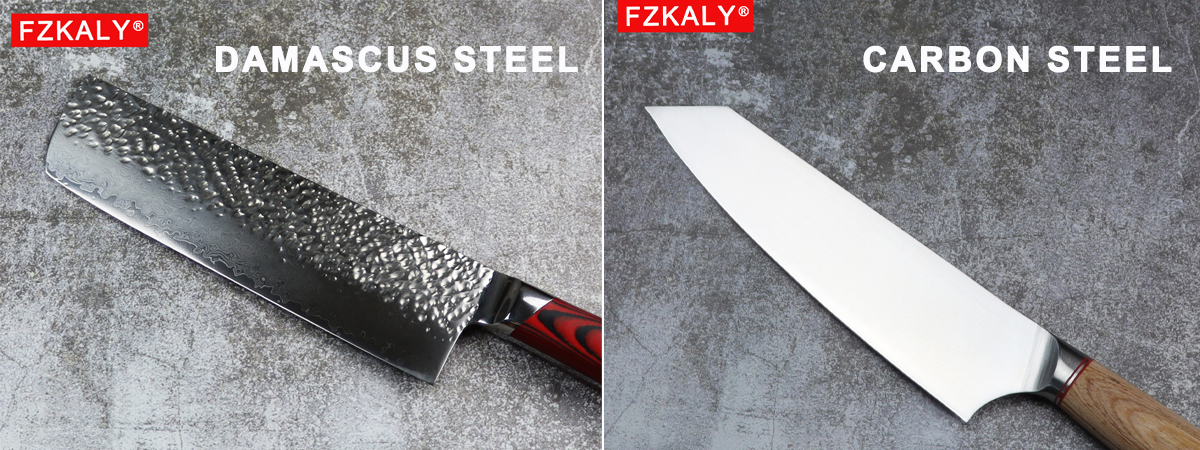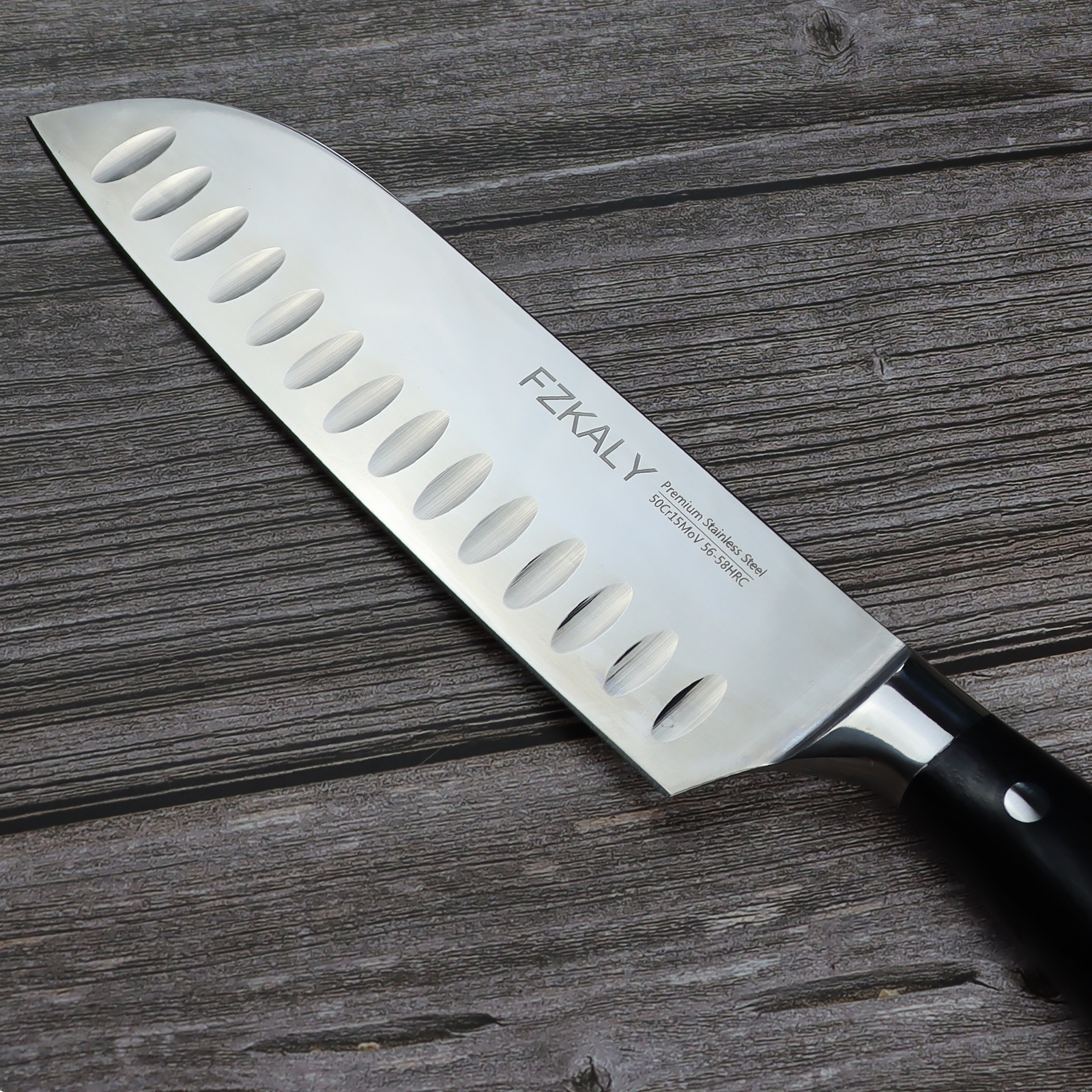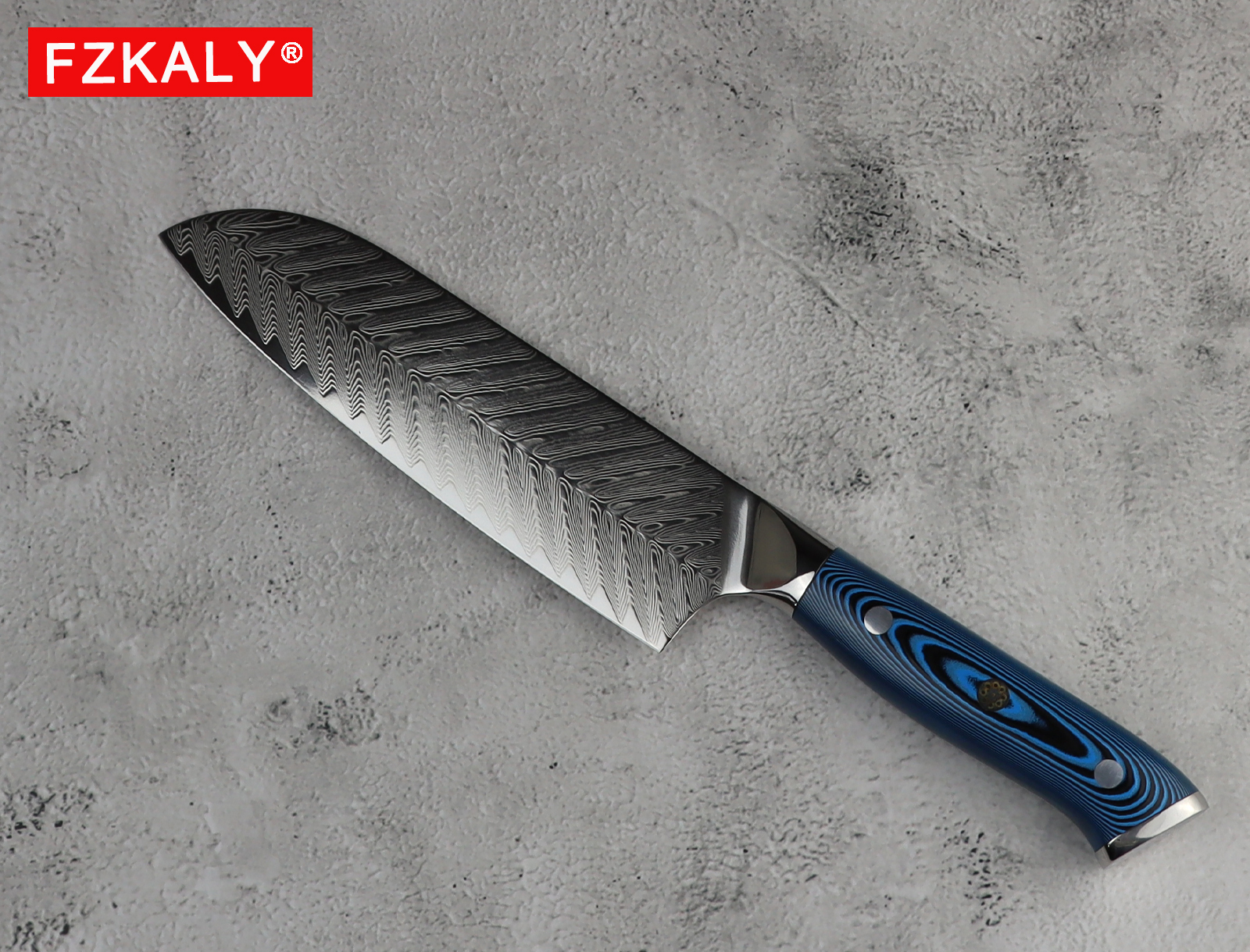The Complete Guide to Damascus Steel VS Carbon Steel
Aug 10,2022 | Fzkaly
Which is better? Damascus steel or Carbon steel knife? Have you ever gotten lost in selecting your kitchen knife, whether you are a pro chef or a cooking beginner looking for your loved knife partner? What do they mean? What is the difference between carbon steel and Damascus steel? Let's make it clear.

A quick review of Damascus steel vs Carbon steel
Two of the most popular kinds of knives are ones made of Damascus steel and ones high in carbon. Damascus sounds fancy, while carbon sounds reliable, so the best choice can sometimes elude us.
Put in simple words, the primary difference between Damascus steel and carbon steel is the craftsmanship, which also results in appearance differences.
Damascus steel is two or more metals with different carbon levels forged and folded together which translates into a unique, wavy pattern.
In turn, Carbon steel has two components carbon and iron, high content in carbon makes it easier to rust, thus needs more maintenance.
What is Carbon steel?
Carbon steel is made by mixing iron with carbon. Carbon is a hard element, thus the higher the content, the stronger the blade, and the blade can keep long edge retention and uneasy to wear out as quickly. High hardness also benefits greater sharpness and more precisely cut, which is the most important reason why professional chefs prefer them.

What are the pros and cons of Carbon steel?
Advantages of Carbon steel
- Carbon blades are also strong and durable as Damascus steel.
- Super sharp and can keep their edge sharp exceptionally well, even when cutting on hard materials.
- Carbon knife is easier to be sharpened and honed than stainless steel knives.
- Carbon knife is cheaper than Damascus steel knife.
- More suited for precision cut.
Disadvantages of Carbon steel
- A carbon steel knife contains more carbon making it chip more easily.
- Carbon knives are easier to rust and corrosion, so they need more maintenance, they need to be cleaned and dried immediately and oiled often to avoid rust.
What is Damascus steel?
Damascus steel is not one single steel, it's more like technology, many layers of different carbon levels of steel are forged and folded together to produce Damascus steel, during the process, produces a particular pattern in different shapes like a ladder, raindrop, shark’s tooth, etc. Damascus steel knives are a work of art, making them popular among cooks.
Of course, except for cosmetic value, the Damascus steel knife also excels in performance. Super sharp, super durable and stays sharp for a long time, which is an advantage in kitchen work.

What are the pros and cons of Damascus steel?
Advantages of Damascus steel
- Damascus blades are very strong and durable and can last a really long time.
- The Damascus chef knife is sharper than most other knives and they are uneasy to become dull, thus, you don't bother about sharpening it frequently.
- The Damascus pattern is visually appealing making them elegant collector's items.
Disadvantages of Damascus steel
- It's difficult to distinguish the real Damascus steel knife, so finding a reliable seller is important.
- Expensive than other knives due to their complicated and longer production time.
- To prolong the lifetime of the Damascus knife, you need to clean and dry it immediately after use.
The differences between Damascus steel and Carbon steel
1. Performance
Both Damascus steel and carbon steel knife are razor-sharp and can hold their edge for a long time. The difference is small enough to not really matter. Both can offer a great cutting experience.
2. Toughness
In a nutshell, The Carbon steel knife is more brittle than Damascus steel. Because Damascus knives fold both tough and softer sheets of steel together, the hard steel ensures high hardness(Sharp), while soft layers absorb shocks, thus, it is more flexible.
3. Resistant to corrosion and rust
From corrosion resistance, they are both very pretentious.
Carbon steel is easier to rust than Damascus steel, especially when touching acidic foods like onions or tomatoes. But with proper care, you can avoid it. How to care about your knives, we'll tell you next.
4. Maintenance
Damascus steel is high-quality and expensive steel, thus it requires special care for it to retain its luster and original beauty. Although they can stay sharp for a long time, when they need sharpening, you'd better use whetstone to avoid damaging their fine edge. However, how to use whetstone requires some effort and skills, so, you have to learn.
On the other hand, carbon knives are easier to sharpen, any available tools are ok. the learning curve is low.
Finally, after cleaning and drying the knife, both carbon and Damascus knife are better to oiled with a special wax or mineral oil to prolong their lifetime.
5. Cost
Carbon knives are cheaper than Damascus but more expensive than stainless steel kitchen knives. Damascus steel is a kind of complex alloy steel, which are far more difficult to heat-treat, so, drives up the cost significantly. While Carbon steel is simpler and less expensive.
6. Appearance
Due to special process, the Damascus knife shows a variety of elegant patterns, which are sought by most people. However, Carbon knife blade is relatively boring.
Which is better: a Damascus or carbon steel knife?
To be honest, in most kitchens, both two knives offer amazing cutting performance and are reliable tools. Which is better is a matter of personal preference.
If you don't want to spend much time on knife maintenance or spend time learning how to sharpen knives, Carbon knives may be better for you. What's more, it is clearly the economically viable option.
If you want to impress your friends or have requirements on looking, and if you have basic skills in knife care and knife sharpening, Damascus knives are worth the money you pay for them.



